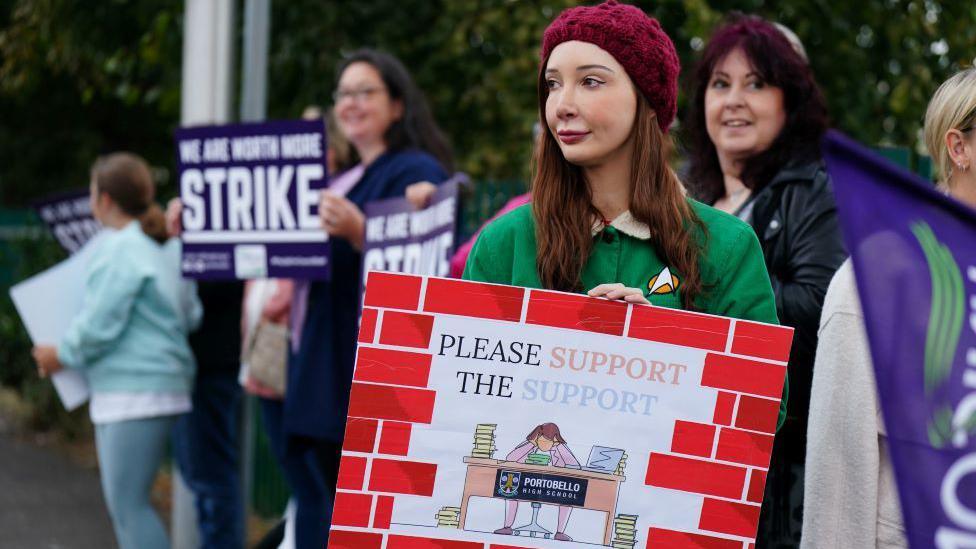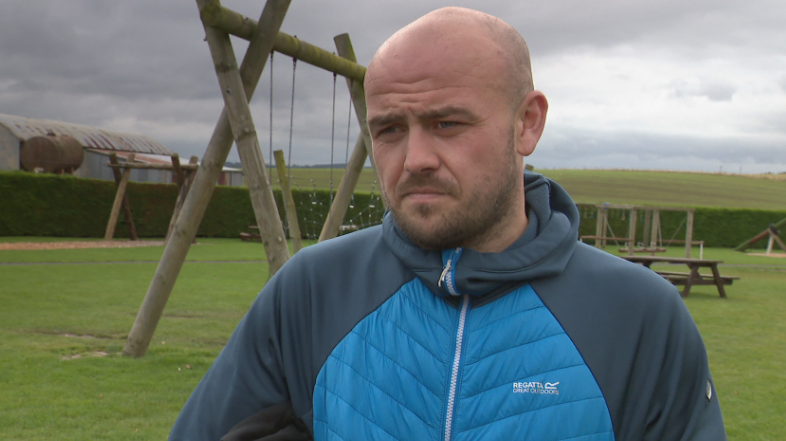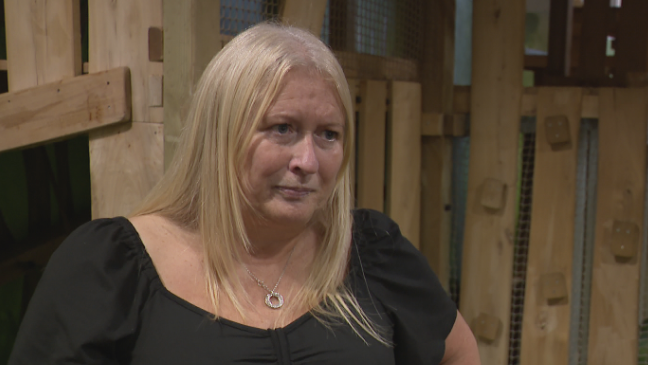Strikes set to close Perth and Kinross schools for two weeks

Unison members have rejected the national pay offer for council staff
- Published
Strike action is set to close schools in Perth and Kinross for two weeks after the largest council union rejected a national pay deal.
The walkout by non-teaching Unison members is due to begin on 21 October and will affect 50 schools and early years centres.
It will start immediately after the two-week October school holiday, meaning schools could be shut for a full month.
Finance Secretary Shona Robison said "no-one's interests will be served by industrial action which will disrupt children attending schools and nurseries".
A Perth and Kinross Council spokesman said the local authority was assessing how the action will impact schools.
He said: "Our intention is to minimise the impact on our children, parents and carers as much as possible and will be issuing further information as soon as possible.”
Unison members reject latest council pay offer
- Published3 September 2024
Union votes to accept bin worker pay deal
- Published29 August 2024
The local government body Cosla also urged Unison to reconsider the offer which it described as "fair, above-inflation and strong".
Thousands of Unison members (86%), including waste and recycling workers as well as education staff, turned down the national offer.
That offer was for a £1,292 per year or 3.6% rise – whichever was higher.
It was accepted by the two other big council unions, Unite and the GMB.
Councils across Scotland have agreed to implement the offer, meaning staff should get their rise and back pay soon.
The Scottish government and council leaders have said there is no more money for pay this year.
Meanwhile, Unison has also warned it will ballot all its council members across Scotland to see if they will go on strike.

Parent Jack South said he was concerned about children getting the education that they need.
The Unison action is targeting the constituency of First Minister John Swinney.
Jack South from Perthshire, who has an eight-year-old son, said the targeted action was "playing politics" with children's lives.
He said: "It's not the children's fault. The thing that's affecting the kids is learning in school.
"I'm more concerned about the children not getting the education that they need."
Grandmother Jacqui Duncan said: "I just think it's totally out of order that they're going on strike for two whole weeks - it's not like the odd day here and there.
"It's going to really affect a lot of children and a lot of parents who have to give up their own work to look after these kids.
"Not everybody can afford childcare, which is extortionate. I just think it's in very bad taste."

Grandmother Jacqui Duncan said childcare during strikes could cause problems
Unison's Perth and Kinross branch secretary Stuart Hope said taking strike action "is the last thing school and early years staff want to do".
But he added: “Employees are taking this first stand on behalf of all local government workers because they’ve seen a decade of pay cuts and they see other sectors being offered deals of greater value.
“The Scottish government needs to understand that council staff need more than platitudes. Ministers must tackle the severe decline in local government funding and start to value councils and their dedicated workforce as they do other areas of public services."
The finance secretary said she hoped that Unison members would "recognise the strength" of the offer, pointing out it had already been accepted by GMB and Unite.
Robison said: "The pay offer is better than that made to local government workers in the rest of the UK and will see the lowest-paid workers, including Unison members, receive a 5.63% pay increase."
Cosla spokesperson Katie Hagmann said the pay offer was "at the absolute limit of affordability" in the extremely challenging financial climate.
She added: "There is no further funding available to increase the value of the offer.
"We are aware that communities will be concerned about the detrimental impact industrial action would have, particularly for our children and young people.
"Industrial action is in nobody’s interests, and we urge Unison to reconsider."

As far as councils are concerned, this year's pay rise is not open to renegotiation.
The offer - made to see off the threat of bin strikes - was accepted by members of two of the three big council unions.
Councils agreed to put the offer into practice so staff should get their increase soon, along with backpay to April.
Council body Cosla and the Scottish government are adamant there is no more money for pay this year.
But as far as Unison is concerned, the issue remains far from resolved.
It wants action to deal with what it sees as a big decline in the value of council pay in recent years.
Action in Perth and Kinross has the potential to cause disruption in First Minister John Swinney's constituency.
Unison knows this. But the action there might only be a taste of things to come.
It intends to ballot council staff across Scotland to see if they will strike over pay.
A mandate for action is not a given. The turnout may be too low, even if a majority of those who vote support striking.
The stakes in this dispute are high for councils, the Scottish government and Unison.
Will this year's pay offer be reopened? Will undertakings be given about next year's? Or will strikes simply highlight how some council staff feel that the services they provide are not properly funded?